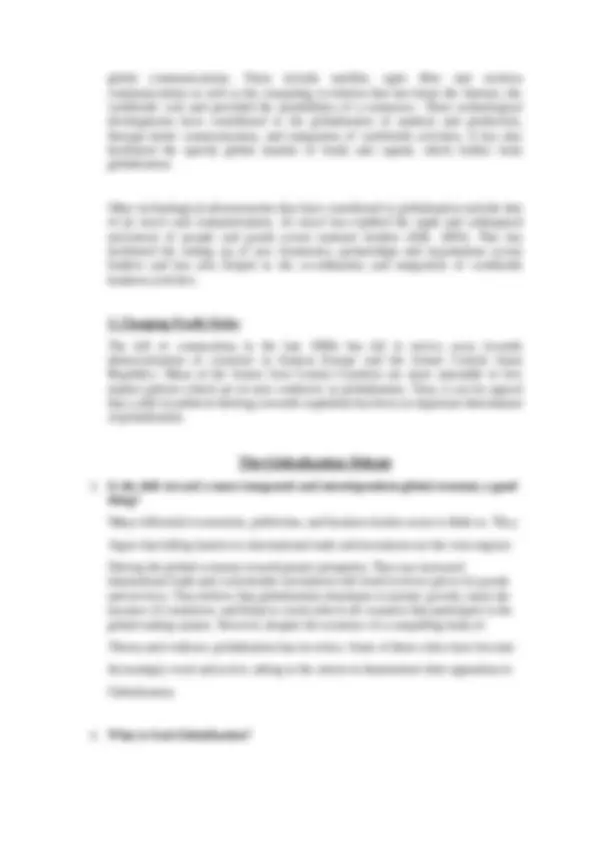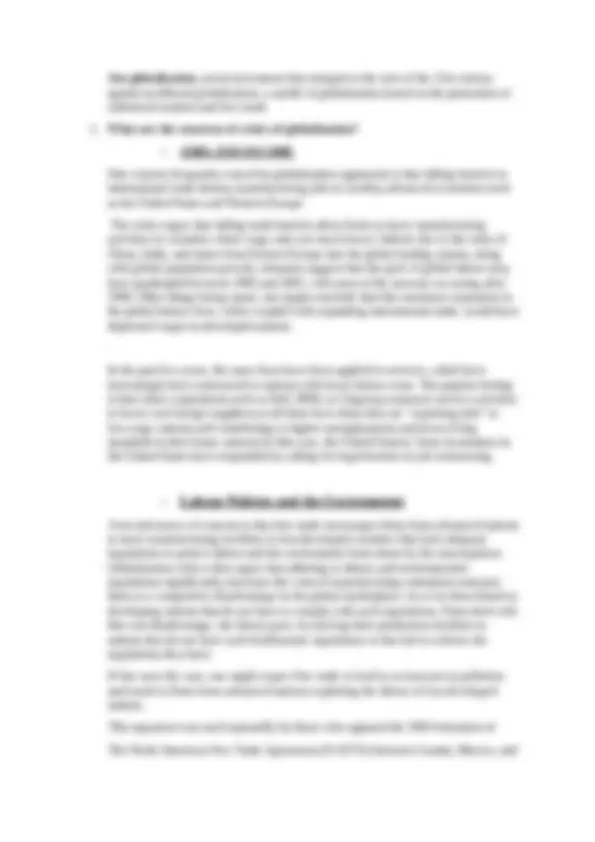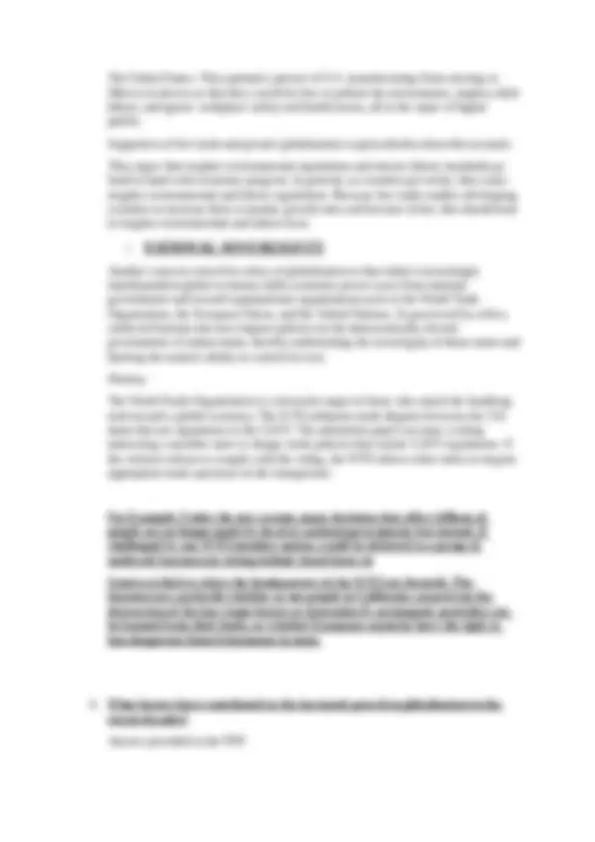





Study with the several resources on Docsity

Earn points by helping other students or get them with a premium plan


Prepare for your exams
Study with the several resources on Docsity

Earn points to download
Earn points by helping other students or get them with a premium plan
Community
Ask the community for help and clear up your study doubts
Discover the best universities in your country according to Docsity users
Free resources
Download our free guides on studying techniques, anxiety management strategies, and thesis advice from Docsity tutors
Point to point notes in the form of ppt
Typology: Lecture notes
1 / 7

This page cannot be seen from the preview
Don't miss anything!




Globalization refers to the trend towards a more integrated global economic system. Globalization is a process of interaction and integration among the people, companies, and governments of different nations, a process driven by international trade and investment and aided by information technology. This process has effects on the environment, on culture, on political systems, on economic development and prosperity, and on human physical well-being in societies around the world
Two key facets of globalization are:
The globalization of markets
The globalization of production
It could have been argued that in the past, one could distinguish between many different national markets. However, globalisation of markets has caused moves towards a single homogeneous global market whereby consumer preferences are converging towards a global norm. One of the strong proponents of such an argument was Levitt (1983) who argued that companies needed to view the world as a single homogeneous, global market for products and services. A global firm should therefore view the world as a single unit and must strive to produce and market standardized product worldwide. Nevertheless, the firm is also expected to adjust its product offerings for local differentiation. The benefits from global standardization have enormous potential since firms are able to achieve economies of scale in many value- chain activities including production, distribution and management.
However, whilst there are indeed many common market needs, demands and acceptance of certain global products, there are also many deep divisions, cultural and other national differences between countries and markets. At the simplest level, these differences relate to differences in product use. For example, in some countries like for instance in Continental Europe, people drive on the right hand side whilst in South Africa or Mauritius for example, people drive on the left hand side. Hence, vehicle specifications to that end will be different.
This refers to the sources of goods and services from locations around the world to take advantage of national differences in the cost and quality of factors of production. Globalisation of production is characterized by increased dispersion of value chain activities to different world locations. Instead of all business activities being singly concentrated, firms may choose to disperse some of their business activities to other locations.
For example, production may be undertaken in certain developing countries where labour is cheap; research and development in another location where high-level specialized skills are in abundance; and assembly may be performed
at yet another location for ease of transport to world markets. As such, firms may exploit national differences in factor conditions such as land, labour, capital and skills, as well as demand conditions, infrastructure and government regulations
1) Declining Trade and Investment Barriers
After the Great Depression and the Second World War, developed countries have opted to remove barriers to international trade and foreign direct investment. This resulted in the GATT (General Agreement on Tariffs and Trade). There were a number of rounds of negotiations between countries which ensued and these led to further reductions and also extended GATT to cover services, intellectual property rights and eventually to the establishment of the World Trade Organisation (WTO) following the Uruguay Round in 1994. The WTO is a permanent body that is responsible for establishing and further entrenching rule based trade and for managing the rule based world-trading system.
These developments have contributed to the reduction of trade and investment barriers and lower restrictions on capital flow. These have in turn facilitated the globalisation of markets and production. In addition to reducing trade barriers, many countries have also been progressively removing restrictions to foreign direct investment that has further boosted world trade growth.
However, whether the removal of those barriers to trade is a good thing is a debatable issue. Many developing countries would argue that given their intrinsically different economic underpinnings, it will be almost impossible for them to compete on a level playing field as is propounded by globalisation. They have further advanced that these barriers or protectionist measures are extremely important in that they provide in most cases a market for the developing countries’ exports.
2. Technology
Over the last decades there has been significant technological advancement. The microprocessor revolution is perhaps the one that has had the most significant impact. Microprocessors are the underlying components that have fuelled the advancement in
Ant globalization , social movement that emerged at the turn of the 21st century against neoliberal globalization, a model of globalization based on the promotion of unfettered markets and free trade.
One concern frequently voiced by globalization opponents is that falling barriers to international trade destroy manufacturing jobs in wealthy advanced economies such as the United States and Western Europe.
The critics argue that falling trade barriers allow firms to move manufacturing activities to countries where wage rates are much lower. Indeed, due to the entry of China, India, and states from Eastern Europe into the global trading system, along with global population growth, estimates suggest that the pool of global labour may have quadrupled between 1985 and 2005, with most of the increase occurring after
.
In the past few years, the same fears have been applied to services, which have increasingly been outsourced to nations with lower labour costs. The popular feeling is that when corporations such as Dell, IBM, or Citigroup outsource service activities to lower cost foreign suppliers-as all three have done-they are "exporting jobs" to low-wage nations and contributing to higher unemployment and lower living standards in their home nations (in this case, the United States). Some lawmakers in the United States have responded by calling for legal barriers to job outsourcing.
A second source of concern is that free trade encourages firms from advanced nations to move manufacturing facilities to less developed countries that lack adequate regulations to protect labour and the environment from abuse by the unscrupulous. Globalization critics often argue that adhering to labour and environmental regulations significantly increases the costs of manufacturing enterprises and puts them at a competitive disadvantage in the global marketplace vis-a-vis firms based in developing nations that do not have to comply with such regulations. Firms deal with this cost disadvantage, the theory goes, by moving their production facilities to nations that do not have such burdensome regulations or that fail to enforce the regulations they have.
If this were the case, one might expect free trade to lead to an increase in pollution and result in firms from advanced nations exploiting the labour of less developed nations.
This argument was used repeatedly by those who opposed the 1994 formation of
The North American Free Trade Agreement (N AFTA) between Canada, Mexico, and
The United States. They painted a picture of U.S. manufacturing firms moving to Mexico in droves so that they would be free to pollute the environment, employ child labour, and ignore workplace safety and health issues, all in the name of higher profits.
Supporters of free trade and greater globalization express doubts about this scenario.
They argue that tougher environmental regulations and stricter labour standards go hand in hand with economic progress. In general, as countries get richer, they enact tougher environmental and labour regulations. Because free trade enables developing countries to increase their economic growth rates and become richer, this should lead to tougher environmental and labour laws.
Another concern voiced by critics of globalization is that today's increasingly interdependent global economy shifts economic power away from national governments and toward supranational organizations such as the World Trade Organization, the European Union, and the United Nations. As perceived by critics, unelected bureaucrats now impose policies on the democratically elected governments of nation-states, thereby undermining the sovereignty of those states and limiting the nation's ability to control its own
Destiny.
The World Trade Organization is a favourite target of those who attack the headlong rush toward a global economy. The WTO arbitrates trade disputes between the 154 states that are signatories to the GATT. The arbitration panel can issue a ruling instructing a member state to change trade policies that violate GATT regulations. If the violator refuses to comply with the ruling, the WTO allows other states to impose appropriate trade sanctions on the transgressor.
For Example: Under the new system, many decisions that affect billions of people are no longer made by local or national governments but instead, if challenged by any WTO member nation, would be deferred to a group of unelected bureaucrats sitting behind closed doors in
Geneva (which is where the headquarters of the WTO are located). The bureaucrats can decide whether or not people in California can prevent the destruction of the last virgin forests or determine if carcinogenic pesticides can be banned from their foods; or whether European countries have the right to ban dangerous biotech hormones in meat.
Answer provided in the PDF